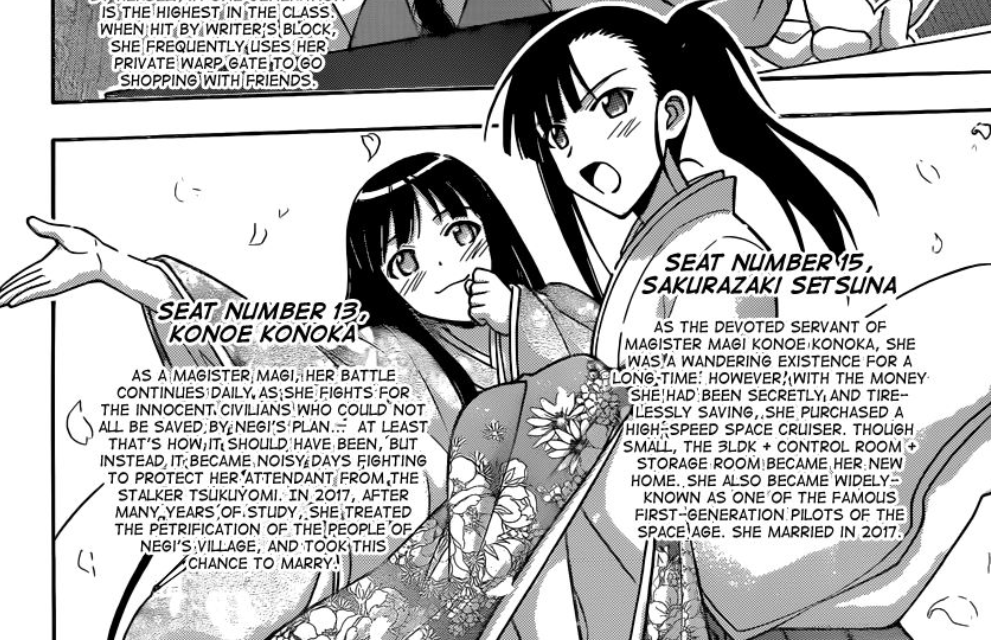Although yuri and yaoi originated in Japan, the civil laws in the country remain strict when it comes to same-sex marriage. In general, same-sex marriage is not even legally recognized in Japan.
Public support for same-sex marriage has been increasing over the past few years, thankfully. But according to “Ishikawa Taiga, the first openly gay man to be elected to the country’s Parliament”, there are “some politicians in the governing party still have outdated views.” They mistakenly believe that same-sex relationships are not “real relationships” and are just a hobby, or that legalizing same-sex marriage will contribute to the country’s declining birth rate.
Of course such “reasons” are nonsense, but I’m not really going to go over why here. Instead, I just wanted to talk about how three different series (two manga, one anime) discuss and challenge the legal status of same-sex marriage in Japan.

First up is the epilogue chapter of Negima! Magister Negi Magi aka Mahou Sensei Negima! in regards to Konoka and Setsuna. The two were childhood friends who fell in love over time and their dynamic, in which Setsuna serves as Konoka’s knight, appears throughout the series and can even be seen here in this panel. Their mutual attraction is actually so obvious to the point that no one is too surprised that the girls end up forming a combat contract of sorts by making out.
With that being said, notice how the narrator text never explicitly states whom Setsuna married. The same goes with Konoka. At this point, the reader already knows they’ll marry each other given their strong feelings, which is further supported by the bridal carry going on here. I guess I feel a bit disappointed that the author left one important detail out even after all the build-up throughout the series and even though the conclusion is obvious.
Whereas Mahou Sensei Negima! all but spells out the same-sex marriage that occurs during the epilogue, Himote House goes with a different approach by having the girls play The Yuri Yuri Game of Life during episode 7. The first half of the game is comedic in how every player was skipping turns due to romantic mishaps with their female friends or crushes or because they angered the yuri gods by attending a mixer with boys.

However, the aesop comes during the second half of the game. With one girl effectively out of the game for 35 turns for daring to attend the aforementioned mixer, the other four players marry one another and the game becomes a team activity. Unfortunately, only one couple gets to emigrate to Europe whereas the other remains in Japan. As a result, the couple that is stuck in Japan has to suffer through bitterness and hardship whereas the other pairing is blessed with fortune and happiness.

The comparison is direct and the message is clear: same-sex marriages are not given the weight they should be given in Japan, which leads to difficulty navigating the red tape to even get married, obstacles such as homophobic prejudices to overcome in order to even find a place to rent, etc. It’s almost laughable how much suffering the couple has to go through in The Yuri Yuri Game of Life just because they live in Japan, but the uncomfortable truth is always buried within amusing humour.

Lastly, Saki has turned out to be really progressive, especially compared to real life Japan. In chapter 210, Yuuki has an internal monologue during which she reveals that her aunt is married to someone from a culture that eats tacos. That explains her fascination with tacos, of course, but it also raises some great questions about the legality of same-sex marriage in Saki. I’m going to assume that the two got married in Japan, but I don’t have any sources for that. If that is indeed the case, then the series is leading by example whereas the other two either (barely) dance around the issue or utilizes satire to poke fun at the situation with same-sex marriage in Japan.
Ahhh, I think that sort of made sense. I’ll just cut things short here.
Thank you for reading.


I can’t actually recollect any manga that portray them??? I have to check the ones you mentioned Remy-nii.
But in webtoons, Gourmet Hound is the exact type of representation that I love. But they don’t address the problems about it or anything…. hm
LikeLike
I’m actually surprised that something like Himote House even addressed a serious issue like that. I didn’t watch it and skipped it because I assumed it would all just be fluff that wasn’t worth my time.
I wonder if part of the reason marriage doesn’t come up too much isn’t just because of Japan’s laws, but because most yuri (and BL, too, I suppose) are about teenagers?? and then a decent amount of yuri is steeped in that “it’s just a phase” trope, too. I want to start finding more yuri centered on adults, and I wonder if they’ll tackle same-sex marriage in Japan seriously…
LikeLiked by 2 people
Yeah it was mostly fluff but it hit the spot for me and that particular episode exceeded expectations haha.
Ahh….yeah, too much yuri and BL is about young adults. Great point ;__; also sorry for the late reply and thanks for responding!
LikeLiked by 1 person
In regards to Saki, apparently the author stated among other things that same-sex marriage is allowed (yurimother.com/post/184880544190).
LikeLiked by 1 person
Oh, I do think I recall hearing about that. I believe Ritz also said they could have babies without men, too. What a nice world. Thank you for sharing!
LikeLike
The difficulty with same-sex relationships in anime and manga is often a complicated topic because while manga and anime are pretty open about it, Japan itself is sadly still behind a bit.
LikeLiked by 1 person
You are definitely right and it always gets me sad whenever I think about it.
LikeLiked by 1 person